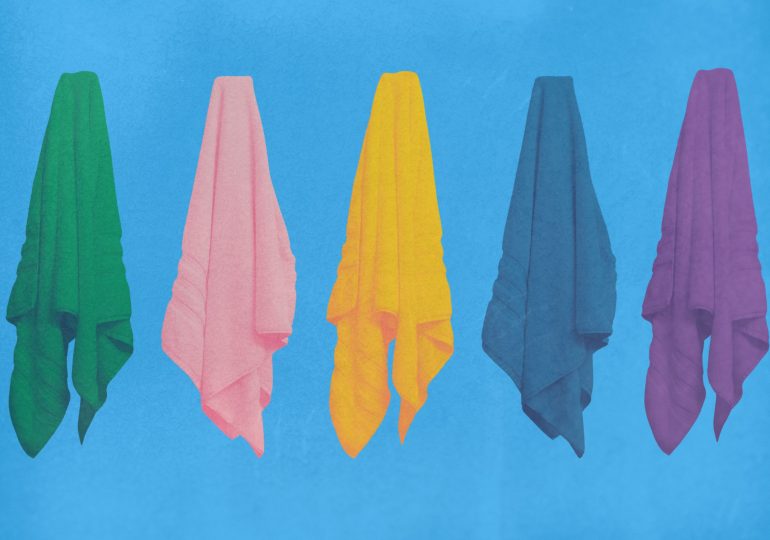You might think your towels don’t get all that dirty. After all, you’re clean when you use them, right?
Wrong, say dermatologists, who argue that people don’t wash their towels often enough.
Here, experts break down how frequently you should toss different types of towels in the laundry—and what can happen if you don’t clean them often enough.
[time-brightcove not-tgx=”true”]
Bath towels
Aim to wash your bath towels every two to three uses at a minimum. If you’re not convinced all that laundry is necessary, consider that you’re rubbing your towels over the most intimate parts of your body. “When we dry off, our towel is collecting a bunch of tiny things we can’t see, including dead skin cells—which kind of slough off—and microorganisms from your body,” says Dr. Kristina Collins, a dermatologist in Austin.
Many of these microorganisms, which include bacteria, viruses, and fungi, are normal and harmless. The problem is, towels can easily become contaminated with unpleasantries such as skin pathogens like Staphylococcus aureus, fecal pathogens, viruses that cause warts, and the fungal species that leads to athlete’s foot and ringworm. “When they have the opportunity to sit there in a moist environment and truly replicate and create a little colony, that can be a source of reinfection back to your skin,” Collins says. “When you use that towel again—let’s say you have breaks in your skin or an acne outbreak that’s compromising your skin barrier—that can be a portal of entry to some of these pathogenic bacteria that have been able to replicate on the towel.”
Read More: How Often Do You Really Need to Wash Your Sheets?
If you have body or face acne, or a condition like eczema that makes you more susceptible to bacteria, it’s a good idea to consider washing your towels more frequently than the average person. “The chances of that towel having these types of microorganisms is going to be higher, and the chance that it can affect the skin is higher, too,” Collins says.
How you dry your towels makes a difference, too. Hang them up on a bar rather than a hook so they can better air out, suggests Dr. Elizabeth Mullans, a dermatologist at Upton Dermatology in Houston. “If it’s on a hook, parts of it will be open to the air, but parts are still going to be all wet and jammed together,” she says, “which means more chances for bacteria and fungi to grow.”
Wash your towels in hot water that’s 170°F or higher, experts advise, which will help kill germs and bacteria.
Face towels
It’s best to have a separate face towel, as opposed to using your body towel to dry your face, Collins tells patients. “You wouldn’t pat your face with your underwear,” she says, so why use a towel that’s been up close and personal with your derriere?
Switch out your face towel after every use, Collins advises. That doesn’t necessarily mean doing laundry every day: She likes buying seven-packs of soft microfiber towels; after using one, she tosses it in the hamper and subs in a fresh one. Doing so helps prevent the transfer of bacteria, oils, and dead skin cells from your body to your face, which could trigger breakouts or other nuisances.
“The face is where people are going to have the most problems from overuse of a towel,” Collins says. “The skin on our bodies is thicker—it’s less susceptible to acne—and our face skin is more sensitive and prone to irritation.”
Beach towels
After you swim, leave some time to dive into your laundry pile: Experts recommend washing towels after every use, especially if you’ve been splashing around a public pool. “They’re exposed to higher moisture from the pool water, which also might have chlorine, organic debris, and other microorganisms, including pseudomonas,” says Dr. Rayva Khanna, a dermatologist at Georgetown University Medical Center. Pseudomonas are bacteria that lurk in warm environments like hot tubs and swimming pools and can cause hot tub folliculitis, an infection of hair follicles. This bacteria can easily spread via towels.
Read More: How to Actually Do Laundry the Right Way
Plus, when you’re in a public space, your towel could come into contact with all kinds of bacteria you’d probably rather not rub onto your body. Not to mention, lots of swimmers hang beach towels outside to dry, which means they’re exposed to allergens wafting through the air. “If you have really bad hay fever, and you’re using something that’s been hung up outside, that can provoke allergies,” Collins says.
There is, however, a saving grace for swimming towels. “Unless you’re a very progressive household, you’re probably wearing a swimsuit,” she says. “So there’s not that direct contact with the genital area that your bath towel has. That in and of itself means the towel is probably not getting as dirty when you’re drying off,” though there are still plenty of reasons to keep up with a rigorous washing schedule.
Gym towels
The most common towel-related question Khanna gets from patients is how often they should wash the towels they carry around in their gym bags. Her answer: After every use.
While many of the same microorganisms that are a threat in your bathroom exist in the gym, there’s a greater risk of cross-contamination in public places, Khanna says. If you use your towel to wipe down equipment, for example, you could wind up with someone else’s bacteria on it (or transfer your own onto the treadmill someone else is about to use).
“You’re hot and sweaty, and you’re going to use it to dry yourself and then stick it in your gym bag,” Mullans says. “The wetter it is, and the longer it’s wet, the more those small amounts of bacteria or fungus are going to multiply,” increasing the risk of athlete’s foot, jock itch, or warts.
How to tell if your towel is making you sick
If you notice whiteheads or little bumps on your skin, it’s possible you could have a superficial bacterial infection. A red, scaly rash could be caused by ringworm or indicate a fungal skin infection, Mullans says. “Sometimes people even get a big boil, or what in medicine we call an abscess,” she adds. “A lot of times, those are related to Staph bacteria,” which can often be drained by doctors but sometimes spread so rapidly, they lead to serious illness and require IV antibiotics.
Read More: How Much Do You Actually Need to Shower?
Any time new symptoms pop up, it’s a good idea to make an appointment with your primary care doctor or dermatologist and find out what’s going on, Mullans says. It could turn out that once you get better acquainted with your laundry machine, your symptoms will improve.
Leave a comment




